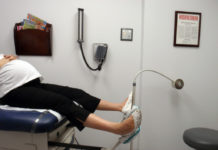Antidepressants Save People From Suicide, Right?
If depression leads to suicide and antidepressants like SSRIs resolve depression, we could decrease suicide rates by increasing the number of antidepressant prescriptions, right? Yet researchers found the opposite in a new study from Sweden that examined antidepressants in the context of suicide.
Vitamin B6 Effective in Reducing Antipsychotic Induced Akathisia
A recent RCT showed that vitamin B6 is as effective as propranolol for the treatment of akathisia.
What Should We Really Call Psychiatric Drugs?
There is no rational way to argue against putting psychiatric chemicals into the category of neurotoxins. All psychiatric substances alter “the structure or functions of the nervous system,” disrupt “the normal function of nerve cells” and act “specifically on nervous tissue.” It is time to clean up the misleading mess of words in psychiatry.
Preventing Long-term Benzodiazepine Use
Researchers Identify risk factors for long-term benzodiazepine use to prevent harmful effects.
Mediterranean Diet Improves Mental Health, Study Finds
A diet rich in fruits, vegetables, whole grains, nuts, and fish has repeatedly been found to improve mental health.
Florida’s “Free Kill” Law – A Death Trap for the State’s Populace and Visitors
Florida’s Wrongful Death Act essentially denies residents and visitors alike the right to live once they enter a hospital. The law has been dubbed “Free Kill” because while it can cost money to correct mistakes, keep hospitals safely staffed and update equipment, it is free to kill.
People Are Dying Prematurely Due to Polypharmacy
Our son, Mark, is an example of the deadly effects of polypharmacy. He died at the young age of 46 and his death was caused by toxicity/cardiac failure from two of the five medications he was taking, at higher than recommended doses, as prescribed by his psychiatrist.
Reducing Antipsychotic Use May Improve Health for People with Mental Health Diagnoses
A new study offers radical solutions for improving the cardiovascular health of people with mental health diagnoses: reducing antipsychotic prescriptions..
Anticholinergic Medications Linked to Dementia Similar to Early Alzheimer’s
A new study, published in the Journal of Clinical Psychiatry, investigates the effects of anticholinergic medications, such as antidepressants and antipsychotics, on cognition in older adults diagnosed with schizophrenia.
Antidepressants During Pregnancy Increase Risk of Psychiatric Diagnosis in Children
New research, based on data from almost a million children in Denmark, suggests that children of mothers who use antidepressants during pregnancy are more likely to be diagnosed with autism and psychiatric disorders.
The Three Most Important Facts About Psychiatric Drugs
Psychologist and educator Michael Corrigan was a guest on my radio show and brought up some questions about how to communicate with people about psychiatric drugs. Specifically, he asked, “What are the three most important things for anyone to know about psychiatric drugs?” Here is my answer.
Intergenerational Impact of Adverse Childhood Experiences
The daughters of children evacuated from Finland during World War II show an increased number of psychiatric hospitalizations.
New Research on Prenatal SSRI Exposure and Autism
Does maternal SSRI exposure increase the chances that a child will develop characteristics associated with Autism Spectrum Disorder (ASD)?
Cognitive-Behavioral Therapy Halves the Risk of Repeated Suicide Attempts
A new study suggests that cognitive-behavioral therapy (CBT) may halve the likelihood of re-attempting suicide, for those who have attempted in the past.
Study Examines the Difficulty of Withdrawing from Antidepressant Drugs
Correcting unnecessary long-term antidepressant use is difficult and met with apprehension by providers and service-users.
The Need to Address Suicide in Prisons
Rates of suicide in prison are significantly higher than in the general population.
Police Violence Victims at Increased Risk of Psychotic Symptoms
Researchers examine links between police victimization and psychotic symptoms in a topical new study.
Scientists Clarify Risks of Augmenting with Antipsychotic Medications for Depression
The researchers found that while antipsychotic drugs may be slightly more effective than alternative antidepressants, they come with a much higher side effect burden.
Children Diagnosed with ADHD Younger are More Likely to get Multiple Medications
New research demonstrates that children diagnosed with ADHD at younger ages are more likely than those diagnosed later to receive multiple medications within five years of their diagnosis.
Scientists Call for Increased Transparency in Research
Scientists at the Yale Collaboration for Research Integrity and Transparency (CRIT) published a new policy paper this month criticizing the current state of biomedical research and calling for improved transparency in research methods.
Study Privileges the Voices of Persons Hospitalized Against Their Will
How people are treated after being hospitalized can either help them to overcome the traumatic effects of coercion or make them worse.
Disinhibited
The party would continue for a time, but an inevitable crash ensued. I left my family, was fired from my job for uncontrollably screaming at my boss, and gambled away whatever money I had left in the stock market. A debilitating depression soon began, of a magnitude I could not previously have imagined. I had lost everyone and everything in my life.
Outcome Reporting Bias in Antipsychotic Medication Trials
A new study in the journal Translational Psychiatry, an influential journal in biological psychiatry published by Nature, challenges the state of the research on antipsychotic drugs.
SSRI Ineffective at Treating Depression in Individuals with Chronic Kidney Disease
Dr. Madhukar Trivedi and colleagues find that the SSRI sertraline does not reduce depressive symptoms any more than placebo in people with Chronic Kidney Disease.
Western ‘Depression’ is Not Universal
Derek Summerfield, consultant psychiatrist at South London and Maudsley National Health Service Foundation Trust, challenges the assumption that Western depression is a universal condition.

































